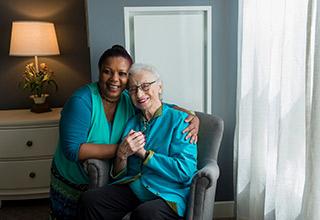Memory Clinics: What To Expect and What To Look For
Learn about the value of receiving care from a multidisciplinary team and what to expect from your first appointment.

While everyone is forgetful from time to time, memory changes can sometimes be the sign of something more serious. When that’s the case, or if you simply want to ensure you’re doing everything you can to keep your brain healthy, a memory clinic is a great place to seek care.
This guide can help you feel more prepared for your visit to a memory clinic.
What is a memory clinic?
A memory clinic is a place where people with any stage of memory loss can go to receive care. Memory clinics are equipped to treat memory disorders ranging from mild cognitive impairment to Alzheimer’s disease and other forms of dementia, frontotemporal disorders, and more.
Memory disorders do not exist in a vacuum. That makes a multidisciplinary and personalized approach essential if patients are to receive the best possible level of care.
Even so, people who receive a dementia diagnosis are sometimes left wanting more when it comes to their care. A report summarizing a series of discussions featuring people living with dementia and caregivers found that what they’re looking for is an individualized and tailored approach to post-diagnostic guidance and care.
While every memory clinic is different, a multidisciplinary health care team that provides comprehensive care and support for not just patients, but their caregivers and families too, is essential for the best quality care. That’s the approach we take at the Deanna and Sidney Wolk Center for Memory Health at Hebrew SeniorLife.
At a memory clinic, you will ideally receive coordinated care among specialists in different disciplines who are all dedicated to treating memory disorders. At the Wolk Center for Memory Health, our team of specialists includes a neurologist, nurse practitioner, psychiatrist, psychologist, social worker, neuropsychologist, and geriatric palliative care specialist.
Our team is dedicated to treating and caring for our patients, working collaboratively with your primary care physician, and providing a high level of support to you and your family at every stage of your disease. Plus, with the Wolk Center for Memory Health under the same roof as the Harvard Medical School-affiliated Hinda and Arthur Marcus Institute for Aging Research, you will have the added bonus of having access to cutting-edge clinical research.
What to expect during your first visit
When you call our memory clinic, we will walk you through the process of getting ready for your first visit. Just picking up the phone and making that call can be a challenging step for many people, which is why we strive to make each person feel heard and understood from the moment they first give us a call or reach out to us online.
Following that first call, we will ask you to fill out our intake packet and then we will reach out for medical records. Once we receive these, we schedule several visits including your intake visit with our nurse practitioner. It’s a good idea to bring a loved one with you if possible, as they can be extremely valuable in helping your provider gain a full picture of what’s been going on.
Before you even walk through the door for that first visit, our nurse practitioner will have done a thorough review of your medical records and intake form to gain an understanding of your unique situation.
You will talk in-depth with the nurse practitioner about the issues and concerns you are experiencing. The nurse practitioner’s assistant will also give you a cognitive screening at this first visit, which takes about 20 minutes. You can expect this visit to take about 90 minutes in total.
What happens after your first visit?
Everyone’s experience differs after the initial visit. A lot will depend on your goals of care and what sort of testing you may have already received. Subsequent visits to the Wolk Center for Memory Health may focus on establishing, as much as possible, a clear diagnosis that will inform the course of your treatment.
Following the initial visit with our nurse practitioner, next steps may include a neuropsychological evaluation, referral for brain imaging like an MRI or PET scan, and an appointment with our neurologist, as well as visits with any of our other specialists as deemed necessary. Ultimately, your treatment will depend on your individual circumstances and goals. The focus will always be on providing the information you and your family need to make informed decisions about your care and supporting you and your family along this journey.
What is a neuropsychological evaluation?
Neuropsychological evaluations are designed to give doctors a more in-depth look at a person’s cognition and memory. They begin with an interview with the patient — ideally, a family member will be present to participate in the interview process.
Based on your interview, a neuropsychologist will determine the best tests to administer during your evaluation to get a better view of your brain function. Neuropsychology testing involves formal tests of your thinking and memory abilities. Examples of neurological tests you could be asked to complete include writing, drawing, giving verbal responses, or answering back-and-forth questions.
When combined with other testing, such as MRIs, it can help your team determine the cause of memory issues. Neuropsychological evaluations at the Wolk Center for Memory Health generally last around two and a half hours.
Our blog post on neuropsychological evaluations offers even more information on what you can expect during this appointment and what it can tell your doctor.
How are memory disorders diagnosed?
There are a number of tools that health care workers can use to help diagnose memory disorders. Your neuropsychological evaluation will give your health care team a better understanding of your cognitive functioning. Brain imaging, such as MRIs or PET scans, is another common diagnostic tool for which you might receive a referral.
There are also newer technologies that allow health care workers to look for amyloid plaques in the brain — abnormal clumps of proteins called amyloid and tau are one sign of Alzheimer’s disease. A lumbar puncture, or spinal tap, can be used to test the amyloid and tau levels in cerebrospinal fluid and indicate whether your brain is affected by Alzheimer’s disease.
Following the initial diagnostic assessments, you will visit with our neurologist, who will review with you the information that has been gathered. In consultation with the team and considering your goals of care, a treatment plan will be established. At the Wolk Center for Memory Health, our specialists will make recommendations about a path forward, but it will ultimately be up to you to determine how you will proceed through the assessment process and beyond.
How are memory disorders treated?
Receiving a specific and early dementia diagnosis can help optimize your treatment options and slow your cognitive decline. Dementia usually starts as mild cognitive impairment, and a timely diagnosis can help you to delay or even prevent mild cognitive impairment from progressing to dementia, which has a much more profound impact on your life.
Once a specific diagnosis is determined, your treatments will be tailored to your needs to slow the progression of your disease and maximize the quality of your life. There are a number of treatments that you might receive at a memory center. At the Wolk Center for Memory Health, some treatment options might include:
- Medications: There are medications available that can help prevent or slow further cognitive decline.
- Lifestyle modifications: Numerous modifiable lifestyle factors significantly impact cognitive health. In other words, there are research-backed ways you can help manage or minimize your memory loss! Recommendations for lifestyle changes may include making changes to your sleep, nutrition, exercise, social connections, vision, hearing, diabetes management, blood pressure management, and weight management.
- Depression treatment: Depression is common in people with cognitive decline. Memory clinics with a geriatric psychiatrist and psychologist can provide treatment for depression, including counseling and medication. At the Wolk Center for Memory Health, we also offer transcranial magnetic stimulation specializing in treating geriatric depression, which is a non-invasive form of treatment that is particularly effective for treatment-resistant depression.
- Brain stimulation: This is a non-invasive form of treatment that has been shown in multiple research studies to be beneficial for patients who have problems with memory, cognition, gait, and balance. While brain stimulation has yet to be FDA-approved for the treatment of memory disorders, research has shown it is safe and effective.
- Palliative care: Dementia symptoms can get in the way of you living your best life, especially as the disease progresses. Palliative care focuses on treating the symptoms affecting your quality of life.
- Clinical research trial opportunities: Patients at the Wolk Center for Memory Health have access to cutting-edge aging and dementia research conducted at Hebrew SeniorLife’s Marcus Institute. If a clinical trial opportunity coordinates with your treatment plan, your clinician can recommend it to you.
Not all memory clinics are equal. It’s worth exploring what treatment options the memory clinic you’re considering offers. One of the top considerations you should keep in mind when you’re choosing a memory clinic is the availability of a multidisciplinary team of providers who will work together to provide you with the best possible treatment, care, and support.
The value of a multidisciplinary team for patients and caregivers
Receiving care from a multidisciplinary team dedicated to your personal success can significantly improve your outcome. We commonly see patients who have received a diagnosis elsewhere only to be left scrambling to figure out their next steps. This sort of disjointed and confusing health care experience is far too common and shouldn’t be the case.
Rather, you should have a team of providers in place who can answer your questions in the wake of a diagnosis that may have left you feeling scared and overwhelmed. That makes all the difference not only for patients — but for caregivers and other family members too. Research has shown that the well-being of caregivers directly affects the well-being of care recipients. Memory clinics should offer caregivers the resources they need to feel supported and become educated.
Support services for both patients and their families are central to the personalized care we provide at the Wolk Center for Memory Health and include:
- Individual and family counseling: Psychotherapy and counseling help patients and family members struggling with the experience of memory loss.
- Memory support groups and caregiver education: Services include in-person and virtual caregiver support groups, patient support groups, and more.
- Wellness for life groups: These structured groups cover wellness topics such as positive emotions, engagement, relationships, and meaning and purpose.
- Dementia caregiver skills group: This is an evidence-based group for caregivers around topics key to caregiving, skill building, and participation in supportive therapeutic discussions.
- Resource coordination: Highly personalized resource referrals specifically address your needs, including referrals to aging life care managers, adult day health programs, and assisted living facilities.
Choosing the right memory clinic for you
If you or a loved one have noticed memory changes that you are concerned about, don’t wait to reach out. The earlier you seek care, the more options you have for treatment and lifestyle interventions. It's never too early to prioritize your brain health! Even if you haven’t noticed any memory changes or symptoms but want a brain health checkup, we encourage you to reach out today.
When choosing a memory clinic, prioritize one that offers a multidisciplinary team with a comprehensive and personalized approach for you and your family. You deserve care and support that will allow you to live your best life at any stage of cognitive function.
If you’re interested in learning more about the Wolk Center for Memory Health, call our office today at 617-363-8600 or contact us online.
Blog Topics
Learn More
Free Guide to Brain Health
Download our free guide, “Optimizing Your Brain Health,” for expert advice on boosting brain health at any age. Explore practical tips and resources from Hebrew SeniorLife’s Deanna and Sidney Wolk Center for Memory Health.

Wolk Center for Memory Health
The Deanna and Sidney Wolk Center for Memory Health at Hebrew SeniorLife provides outpatient memory care services, in person and virtually, for people living with cognitive symptoms — and for their families and caregivers.

Coping with Memory Loss
From our Wolk Center for Memory Health to Assisted Living to Memory Care Assisted Living, we offer a wide range of memory care services and support.




